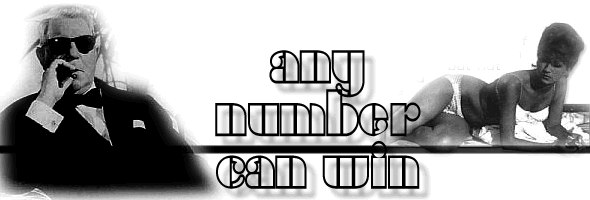
B&W, 1963, 103m. / Directed by Henri Verneuil / Starring Jean Gabin, Alain Delon / Image (US R1 NTSC), Amuse (Japan R2 NTSC) / WS (2.35:1) (16:9)
Based on the novel John Trinian novel The Big Grab, the French thriller Mélodie en sous-sol (retitled Any Number Can Win for the US) belongs squarely in the tradition of cool crime studies like Breathless and Le Samouri, albeit with a welcome humanist edge. A typically sleek and cool French thriller in the best '60s mold, this offers a showcase for two great pros of Euro cinema, Jean Gabin (Grand Illusion) and Alain Delon (Purple Noon), at the top of their form. Just out of prison, aging con Charles (Gabin) is torn between the demands of his wife to settle down and the urge to pull off one last heist before he retires. For his partner in crime, Charles picks the young, cocky Francis (Delon), to whom he bestows the blueprints for a lavish Cannes casino. Francis infiltrates the casino's hotel, where he mingles with the local beauties (including a visiting Palm Beach ballet troupe!) and scopes out a path to the casino vault through the air ducts. When the day of the heist arrives, both men hope their plan will be foolproof... but of course, it isn't.
More concerned with character development and fetching scenery than fast paced action or twists, Any Number Can Win follows in the footsteps of such leisurely Riviera caper films as Hitchcock's To Catch a Thief. Gabin and Delon make a good team, with the latter at the height of his poster boy career, and the catchy jazz/lounge score keeps the proceedings from ever bogging down under the sure hand of crime film specialist Henri Verneuil (Public Enemy Number One). Not a classic by most standards, this nifty little cocktail aspires only to entertain and does so quite efficiently, and the final ironic scene is truly marvelous. Though the Image packaging offers no information about the film's presentation, this film has been preserved on DVD in its original Dyaliscope aspect ratio, and it's anamorphically enhanced, to boot. The quality is as impressive as possible for a black and white '60s film; the background detail remains constantly sharp and crisp, though some scenes are deliberately bright and overexposed, particularly during close ups and swimming pool scenes. Optional yellow English subtitles offer a faithful translation of the French dialogue, and the mono audio is clean and free of distortion throughout. The print sports an MGM logo before the credits. For completists a Japanese release boasts an anamorphic widescreen transfer of both the standard international 103 minute cut and a 121 minute version consisting of longer and alternate takes, both in French with optional Japanese subtitles.
